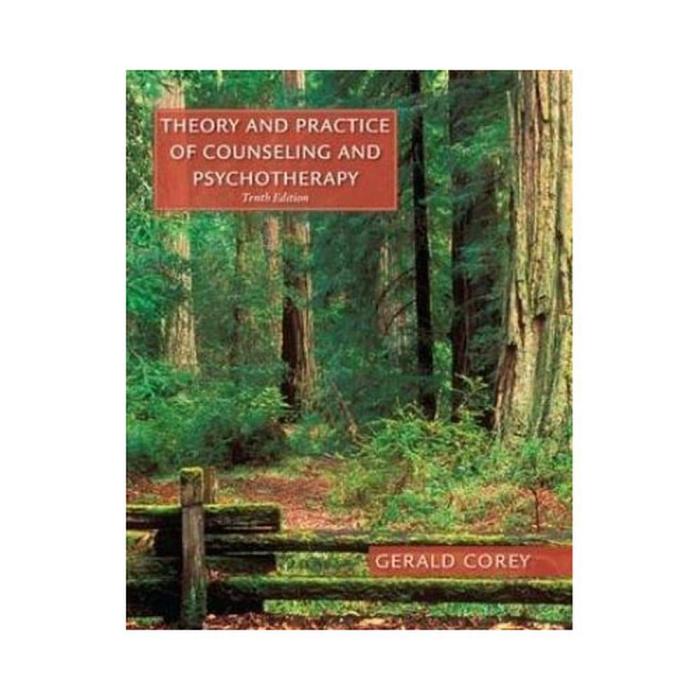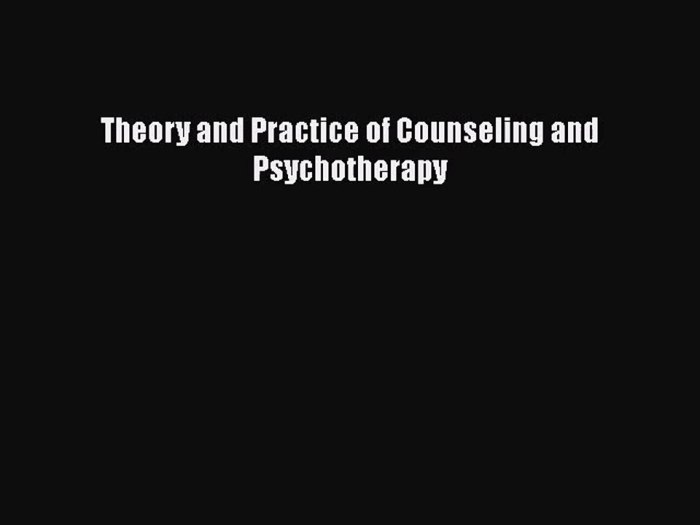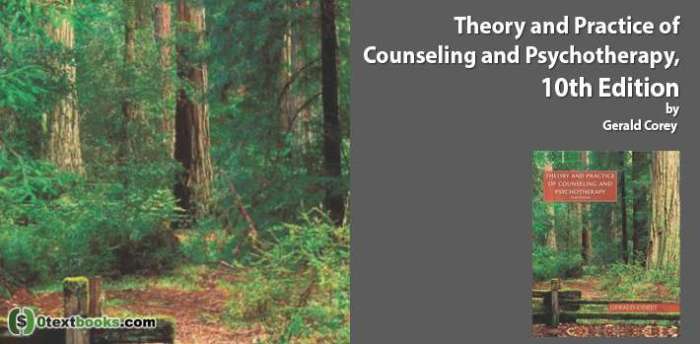Theory and practice of counseling and psychotherapy 11th edition – Welcome to the 11th edition of “Theory and Practice of Counseling and Psychotherapy,” a comprehensive guide to the field. This updated edition provides a thorough overview of the major theoretical orientations, ethical and legal considerations, and special populations in counseling and psychotherapy.
Whether you’re a seasoned professional or a student seeking a foundation in the field, this text offers invaluable insights into the theory and practice of counseling and psychotherapy.
Theoretical Foundations of Counseling and Psychotherapy

Counseling and psychotherapy have a rich history, with roots in ancient healing practices and philosophical traditions. Over time, various theoretical orientations have emerged, each offering a unique perspective on the nature of human distress and the process of change.
Major Theoretical Orientations
- Psychodynamic Therapy: Focuses on unconscious conflicts and early childhood experiences.
- Behavioral Therapy: Emphasizes observable behaviors and the role of learning in psychological problems.
- Cognitive Therapy: Focuses on the role of thoughts and beliefs in shaping emotions and behaviors.
- Humanistic Therapy: Emphasizes the individual’s potential for growth and self-actualization.
- Integrative Therapy: Combines elements from multiple theoretical orientations.
Counseling and Psychotherapy Process

The counseling and psychotherapy process typically involves a series of stages, including:
Stages of the Process
- Intake and Assessment: Initial contact and gathering of information.
- Treatment Planning: Collaboratively developing goals and a plan for therapy.
- Intervention: Implementing specific techniques and strategies.
- Termination: Ending the therapeutic relationship.
Role of the Counselor and Client
The counselor provides a supportive and non-judgmental environment, while the client actively participates in the process by sharing experiences, setting goals, and practicing new behaviors.
Techniques and Interventions
- Talk Therapy: Verbal communication and exploration of thoughts and feelings.
- Cognitive-Behavioral Therapy: Techniques that challenge negative thoughts and behaviors.
- Humanistic Therapy: Techniques that focus on empathy, unconditional positive regard, and self-discovery.
Ethical and Legal Issues in Counseling and Psychotherapy: Theory And Practice Of Counseling And Psychotherapy 11th Edition

Counselors and psychotherapists must adhere to ethical and legal guidelines to protect the well-being of their clients.
Ethical Principles
- Confidentiality: Maintaining the privacy of client information.
- Competence: Providing services within the scope of one’s training and expertise.
- Informed Consent: Obtaining the client’s informed consent before initiating treatment.
Legal Responsibilities
- Reporting Child Abuse: Mandatory reporting of suspected child abuse.
- Duty to Warn: Duty to take reasonable steps to protect others from harm posed by a client.
- Malpractice: Legal liability for negligence or misconduct in providing counseling services.
Special Populations and Counseling and Psychotherapy

Counselors and psychotherapists work with diverse populations, each with unique needs.
Unique Needs of Special Populations, Theory and practice of counseling and psychotherapy 11th edition
- Children and Adolescents: Developmental challenges, family dynamics, and peer relationships.
- Couples and Families: Relationship issues, communication patterns, and family dynamics.
- Older Adults: Age-related challenges, grief and loss, and health concerns.
Modifications for Special Populations
- Play Therapy for Children: Using play to facilitate communication and exploration.
- Family Therapy: Involving the family in the therapeutic process to address relationship dynamics.
- Cognitive-Behavioral Therapy for Older Adults: Focus on improving memory, problem-solving, and coping skills.
Research in Counseling and Psychotherapy
Research plays a vital role in advancing the field of counseling and psychotherapy.
Importance of Research
- Evaluating the Effectiveness of Interventions: Determining the efficacy and effectiveness of different therapeutic approaches.
- Developing New Interventions: Creating evidence-based interventions to address specific mental health issues.
- Informing Practice: Translating research findings into clinical practice to improve client outcomes.
Research Methods
- Quantitative Research: Using statistical methods to analyze numerical data.
- Qualitative Research: Using qualitative methods to explore experiences and perspectives.
- Mixed Methods Research: Combining quantitative and qualitative methods for a comprehensive understanding.
Professional Development in Counseling and Psychotherapy
Counselors and psychotherapists must engage in ongoing professional development to maintain their skills and knowledge.
Benefits of Professional Development
- Enhanced Clinical Skills: Acquiring new techniques and interventions to improve client outcomes.
- Expanded Knowledge Base: Staying abreast of current research and best practices.
- Improved Ethical Decision-Making: Enhancing ethical sensitivity and competence.
Challenges of Professional Development
- Time Constraints: Balancing professional development with clinical work and personal commitments.
- Financial Considerations: Covering the costs of training and conferences.
- Access to Resources: Limited availability of professional development opportunities in certain areas.
Answers to Common Questions
What are the key theoretical orientations in counseling and psychotherapy?
The major theoretical orientations include psychodynamic, humanistic, cognitive-behavioral, behavioral, and systems theories.
What is the role of the counselor in the counseling process?
The counselor’s role is to provide a supportive and non-judgmental environment, facilitate client self-exploration, and assist in the development of coping mechanisms and problem-solving skills.
What are some ethical considerations in counseling and psychotherapy?
Ethical considerations include confidentiality, informed consent, dual relationships, and cultural sensitivity.